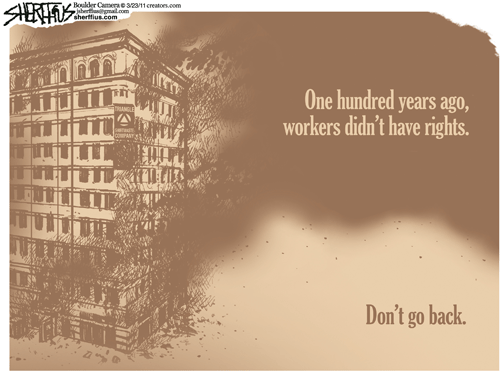“Punting the Pundits” is an Open Thread. It is a selection of editorials and opinions from around the news medium and the internet blogs. The intent is to provide a forum for your reactions and opinions, not just to the opinions presented, but to what ever you find important.
Thanks to ek hornbeck, click on the link and you can access all the past “Punting the Pundits”
Dean Baker: The Imaginary World in Which Washington Lives
It is a beautiful spring day in Washington. This is a nice respite from the horrors taking place in Japan and the ever-growing nuttiness of D.C. politics. Enjoying the weather provides a nice alternative to listening to the news or reading the newspaper.
The flood of nonsense in the traditional news outlets just continues to grow. At the top of the list is the steady stream of senators or members of Congress whose response to higher gas prices is to insist on drilling in every square inch of environmentally sensitive territory in the country. This is supposed to reduce our dependence on imported oil and lower the price of gas. Both sides of this assertion are absurd.
Glen Greenwald: The Manipulative Pro-War Argument in Libya
Advocating for the U.S.’s military action in Libya, The New Republic‘s John Judis lays out the argument which many of his fellow war advocates are making: that those who oppose the intervention are guilty of indifference to the plight of the rebels and to Gadaffi’s tyranny
snip
Note how, in Judis’ moral world, there are only two possibilities: one can either support the American military action in Libya or be guilty of a “who cares?” attitude toward Gadaffi’s butchery. At least as far as this specific line of pro-war argumentation goes, this is just 2003 all over again. Back then, those opposed to the war in Iraq were deemed pro-Saddam: indifferent to the repression and brutalities suffered by the Iraqi people at his hands and willing to protect his power. Now, those opposed to U.S. involvement in the civil war in Libya are deemed indifferent to the repression and brutalities suffered by the Libyan people from Gadaffi and willing to protect his power. This rationale is as flawed logically as it is morally.
Harold Meyerson: The mind-set that survived the Triangle Shirtwaist fire
The seamstresses were just getting off work that Saturday, some of them singing a new popular song, “Every Little Movement (Has a Meaning of Its Own),” when they heard shouts from the eighth floor just below. They saw smoke outside the windows, and then fire. As David Von Drehle recounts the ensuing catastrophe, in his award-winning book “Triangle,” just a couple minutes later the ninth floor was fully ablaze.
snip
Businesses reacted as if the revolution had arrived. The changes to the fire code, said a spokesman for the Associated Industries of New York, would lead to “the wiping out of industry in this state.” The regulations, wrote George Olvany, special counsel to the Real Estate Board of New York City, would force expenditures on precautions that were “absolutely needless and useless.”
“The best government is the least possible government,” said Laurence McGuire, president of the Real Estate Board. “To my mind, this [the post-Triangle regulations] is all wrong.”
Such complaints, of course, are with us still. We hear them from mine operators after fatal explosions, from bankers after they’ve crashed the economy, from energy moguls after their rig explodes or their plant starts leaking radiation. We hear them from politicians who take their money. We hear them from Republican members of Congress and from some Democrats, too. A century after Triangle, greed encased in libertarianism remains a fixture of – and danger to – American life.
 Welcome to the Stars Hollow Health and Fitness weekly diary. It will publish on Saturday afternoon and be open for discussion about health related issues including diet, exercise, health and health care issues, as well as, tips on what you can do when there is a medical emergency. Also an opportunity to share and exchange your favorite healthy recipes.
Welcome to the Stars Hollow Health and Fitness weekly diary. It will publish on Saturday afternoon and be open for discussion about health related issues including diet, exercise, health and health care issues, as well as, tips on what you can do when there is a medical emergency. Also an opportunity to share and exchange your favorite healthy recipes. 

 Rep. John Conyers:
Rep. John Conyers: 
 The outrageous onslaught against workers, women and our intelligence continues.
The outrageous onslaught against workers, women and our intelligence continues.
Recent Comments